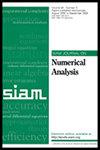随机演化方程的领域分解法
IF 2.9
2区 数学
Q1 MATHEMATICS, APPLIED
引用次数: 0
摘要
SIAM 数值分析期刊》,第 62 卷第 6 期,第 2611-2639 页,2024 年 12 月。 摘要。近年来,随机偏微分方程(SPDEs)已成为数学中研究得很透彻的领域。随着随机偏微分方程的普及,如何有效地近似求解随机偏微分方程变得非常重要。因此,我们的目标是为开发高效实用的 SPDEs 时步法做出贡献。算子分裂方案为确定性和随机微分方程提供了强大、高效和灵活的数值方法。域分解方案就是一个例子,它将域分割成子域,并以分而治之的策略构建数值近似方法。这样就不用解决整个域上一个昂贵的问题,而是处理子域上更便宜的问题。这在现代计算机架构中特别有用,因为子问题通常可以并行求解。虽然拆分方法已被用于研究确定性 PDEs 的域分解方法,但这是 SPDEs 的一种新方法。这意味着,尽管算子拆分域分解方法的构件是标准的,但现有的收敛性分析并不直接适用。我们对随机演化方程的分裂方案进行了抽象的收敛分析,并将域分解方案作为该设置的一个应用进行了阐述。我们通过数值实验验证了理论结果。本文章由计算机程序翻译,如有差异,请以英文原文为准。
A Domain Decomposition Method for Stochastic Evolution Equations
SIAM Journal on Numerical Analysis, Volume 62, Issue 6, Page 2611-2639, December 2024.
Abstract. In recent years, stochastic partial differential equations (SPDEs) have become a well-studied field in mathematics. With their increase in popularity, it becomes important to efficiently approximate their solutions. Thus, our goal is a contribution towards the development of efficient and practical time-stepping methods for SPDEs. Operator splitting schemes provide powerful, efficient, and flexible numerical methods for deterministic and stochastic differential equations. An example is given by domain decomposition schemes, where one splits the domain into subdomains and constructs the numerical approximation in a divide-and-conquer strategy. Instead of solving one expensive problem on the entire domain, one then deals with cheaper problems on the subdomains. This is particularly useful in modern computer architectures, as the subproblems may often be solved in parallel. While splitting methods have already been used to study domain decomposition methods for deterministic PDEs, this is a new approach for SPDEs. This implies that the existing convergence analysis is not directly applicable, even though the building blocks of the operator splitting domain decomposition method are standard. We provide an abstract convergence analysis of a splitting scheme for stochastic evolution equations and state a domain decomposition scheme as an application of the setting. The theoretical results are verified through numerical experiments.
Abstract. In recent years, stochastic partial differential equations (SPDEs) have become a well-studied field in mathematics. With their increase in popularity, it becomes important to efficiently approximate their solutions. Thus, our goal is a contribution towards the development of efficient and practical time-stepping methods for SPDEs. Operator splitting schemes provide powerful, efficient, and flexible numerical methods for deterministic and stochastic differential equations. An example is given by domain decomposition schemes, where one splits the domain into subdomains and constructs the numerical approximation in a divide-and-conquer strategy. Instead of solving one expensive problem on the entire domain, one then deals with cheaper problems on the subdomains. This is particularly useful in modern computer architectures, as the subproblems may often be solved in parallel. While splitting methods have already been used to study domain decomposition methods for deterministic PDEs, this is a new approach for SPDEs. This implies that the existing convergence analysis is not directly applicable, even though the building blocks of the operator splitting domain decomposition method are standard. We provide an abstract convergence analysis of a splitting scheme for stochastic evolution equations and state a domain decomposition scheme as an application of the setting. The theoretical results are verified through numerical experiments.
求助全文
通过发布文献求助,成功后即可免费获取论文全文。
去求助
来源期刊
CiteScore
4.80
自引率
6.90%
发文量
110
审稿时长
4-8 weeks
期刊介绍:
SIAM Journal on Numerical Analysis (SINUM) contains research articles on the development and analysis of numerical methods. Topics include the rigorous study of convergence of algorithms, their accuracy, their stability, and their computational complexity. Also included are results in mathematical analysis that contribute to algorithm analysis, and computational results that demonstrate algorithm behavior and applicability.

 求助内容:
求助内容: 应助结果提醒方式:
应助结果提醒方式:


